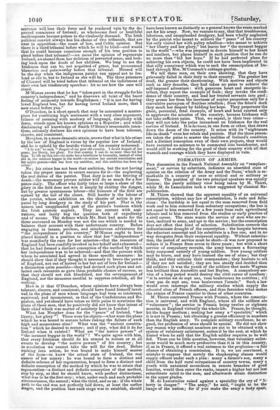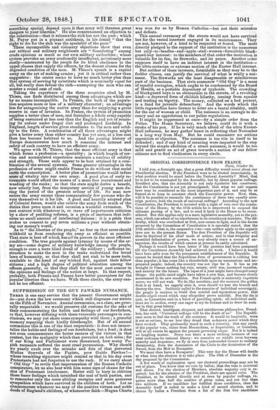FORMATION OF ARMIES.
THE discussion in the French National Assembly on " remplace- ment," or service by substitute, indicates an unsettled state of opinion on the relation of the Army and the State, which is re- markable in a country at once so critical and so military as France. The position of the two principal speakers was equally curious; the purely military view being taken by M. Thiers, while M. de Lamoriciere took a view suggested by classical Re- publicanism.
M. Thiers showed that the apparent equality of an universal conscription, without any law of substitution, is rude and falla-
cious: the hardship is not equal to the man removed from field work and to him removed from sedentary occupations; the loss is not equal to him removed for a few years from rude agricultural labours and to him removed from the studies or early practice of a civil career. The state wants the service of men who are ro- bust, inclined to arms, and apt to the service ; but the conscription does not effect that kind of selection. Substitution corrects the indiscriminate draught of the conscription : the bargain between the reluctant conscript and his substitute is a free one, and in no way derogates from their reciprocal equality. Without substitu- tion, the period of service must be short—it was now proposed to reduce it in France from seven to three years ; but with a short service of compulsory recruits, the army becomes a fluctuating body composed entirely of young soldiers. Now young soldiers may be brave, and may have learned the use of arms ; but they think, and they criticize their commanders ; they hesitate to act if they are not satisfied ; they are less steady and decided than old soldiers : it was the youth of the soldiers that made Wagram less brilliant than Austerlitz and lost Baylen. A compulsory ser- vice of a long period would destroy the civil career of numbers : " si la service eat de sept ans, vous bouleversez lea carrieres ; s'il n'est pas de sept ans, vous bouleversez Parmee." Such a law would even interrupt the military studies which supply the educated class of French officers, and thus furnishes what makes the armies of France superior to those of other countries.
M. Thiers contrasted France with Prussia, where the conscrip- tion is universal, and with England, where all the soldiers are " volunteers "; the service in Prussia being twelve or eighteen months, in England virtually the whole life. France, he thought, hit the happy medium ; making her army a " specialite," which it is not in Prussia; but obtaining a greater efficiency in numbers than the English army. To complete military excellence, he ar- gued, the profession of arms should be special. He did not show any reason why sufficient numbers are not to be obtained with a system of voluntary enlistment, unless it be the cost, at which he hinted when he said that the English soldier requires to be well fed. There can be little question, however, that voluntary enlist- ment would be much more productive than it is in this country, if, as in France, it offered a real entrance to the profession—a fair chance of obtaining a commission. It is, we are convinced, a mistake to suppose that merely the shopkeeping classes would supply officers under such a plan : many a farmer's son, many a child from the half rural occupations of country towns, many a youth with untainted escutcheon in remote branches of good families, would then enter the ranks, impart a higher but not less subordinate spirit to the men, and afterwards attain distinction in the upper grades.
M. de Lamoriciere raised against a speciality the cry of "li- berty in danger." "The army," he said, " ought to be the image of the nation; for if you make the army a body apart,
something special, depend upon it that army will threaten great dangers to your liberties." He also countenanced an objection to the substitution—that it releases the rich but not the poor • which M. Payer put in a piquant antithesis, in his denial "that the right to die for the rich was the specialite of the poor." These incompatible and visionary objections show that even our critical and military neighbours are "floundering" among crude opinions as much as our own military authorities ; whose system provides an army confessedly insufficient, notoriously most costly—mistrusted by the people for its blind obedience to the upper classes that supply the officers, by the decent classes for the degraded condition of the men. M. Thiers's speech is a capital essay on the art of making armies ; yet it is critical rather than suggestive : the orator seems to have no much better plan than that system of serving by substitute which is nominally equal for all, but really does favour the rich—exempting the man who can muster a round sum of cash.
Taking the experience of the three countries cited by M. Thiers, one finds distributed among them advantages which are by no means incompatible. In Prussia, the bulk of the popula- tion acquires more or less of a military character ; an advantage less for antagonizing the native army than for supplying a great reserve in case of invasion. In France, the system of promotion supplies a better class of men, and furnishes a whole army capable of being sustained at less cost than the English and yet of retain- ing its ardour under frugal diet and prolonged hardship. In England, length of service gives steadiness to the men and solid- ity to the force. A combination of all those advantages might give a better army than either country has yet seen, at a less cost than has become habitual to us. And the passing history of Europe demonstrates how much it concerns the interest and safety of each country to have an efficient army. We agree with M. Thiers, that the most efficient army is that which forms a profession—a speciality ; in which length of ser- vice and accumulated experience maintain a nucleus of solidity and strength. Those ends appear to be best attained by a com- bination of the several systems. Some greater advantages in the profession of arms might enable France to do without that social curse the conscription. A better plan of promotions would infuse more of vitality into our own army. A good plan of early re- tirements would afford the means of a more free recruitment and weeding of the ranks ; so that the state might derive a benefit, now utterly lost, from the temporary service of young men du- ring the period of the greatest ardour of life. No man now enters the army except those comparatively few persons who de- vote themselves to it for life. A good and heartily adopted plan of Colonial forces, would also relieve the army from much of the duties that press upon it and occasion a wasteful extension. To rest content with whatever is, or stave off importunate criticism by a show of peddling reforms, is a pride of inertness that indi- cates no small amount of intellectual dulness : it is a pride that makes us consent to pay seven millions a year without obtain- ing our money's worth. As ta " the liberties of the people," no fear on that score should withhold us from rendering the army as efficient as possible. That state is best off which has all its powers in the most efficient condition. The true guards against tyranny by means of the ar- my are—some degree of military knowledge among the people, enough to cure a mere blind dread of the soldiery ; sufficient in- struction to make the men in the ranks understand the broad laws of humanity, so that they shall not sink to be mere tools, available to the hand of any wicked fool, against their fellow citizens ; and a high degree of political education among the officers generally, so that they shall for the most part concur in the opinions and feelings of the nation at large. In that respect, probably, both Prussia and France have better guarantees for the popular liberties than we have. With those checks, the army can- not be too efficient.



























 Previous page
Previous page